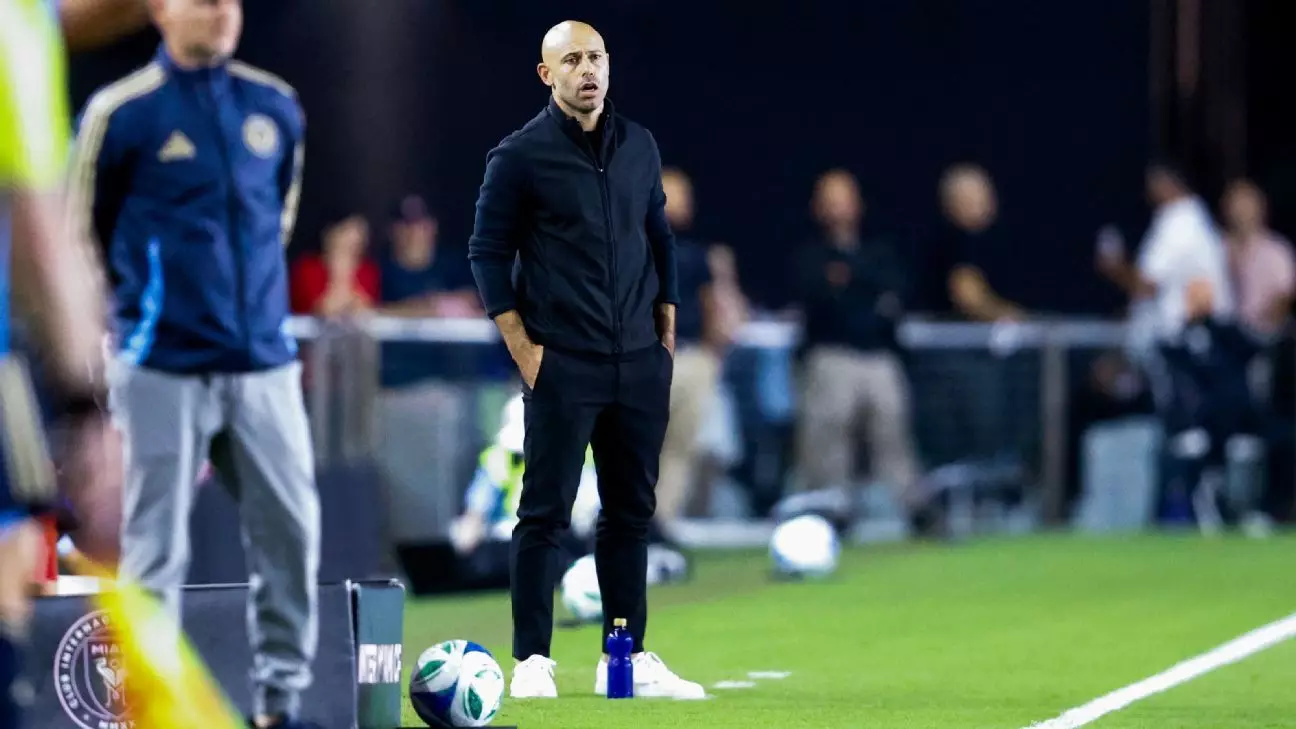The first leg of the Concacaf Champions Cup quarterfinal series at BMO Stadium was laden with tension, and the weather wasn’t the only thing causing heated exchanges on Wednesday night. Inter Miami’s head coach, Javier Mascherano, found himself embroiled in a passionate defense of his team following what he deemed an egregious officiating error. The spotlight fell on LAFC player Nathan Ordaz, whose apparent elbowing of Miami defender Maximiliano Falcón during the first half led the referee, Oshane Nation, to consult VAR. The final verdict? A mere yellow card. Mascherano strongly disagreed, suggesting that this call—or lack thereof—was an affront to the very spirit of fair play.
From the sidelines, it’s easy to criticize a referee’s decision, but in this instance, Mascherano’s critique holds weight. The act of elbowing an opponent, particularly in a way that seems intentional, raises questions about player safety and the integrity of the game. This accusation is compounded when considering Mascherano’s assertion that similar incidents would draw red cards regardless of the venue—be it local grounds or international competitions. The head coach articulated his frustration by challenging the inconsistencies in soccer officiating, emphasizing that certain acts of aggression should universally warrant serious penalties.
A Game-Changer: Ordaz’s Golden Goal
Despite the controversy surrounding Ordaz’s conduct, the player managed to put the game in LAFC’s favor, scoring the only goal of the match in the second half. The irony is that a player who seemed to escape decisive punishment went on to become the hero for his squad. This adds layers of complexity to the conversation around officiating—breaking down not just the referee’s immediate decisions but their longer-term implications for a game’s narrative. The dynamics shift when players can capitalize on questionable officiating, as it ultimately stirs feelings of injustice among opponents.
A match can hinge on a single moment, and in this case, it was not just the goal that determined the result, but the backdrop of officiating that overshadowed LAFC’s triumph in the first leg. Questions abound: did the refereeing impact the morale and performance of Inter Miami? In professional sports, the psychology of the game can often be as critical as the physical competition, and the aftermath of perceived injustices can have lingering effects.
Hope Amid Setbacks: The Road Ahead for Inter Miami
As Inter Miami set its sights on the second leg of this gripping series, Coach Mascherano remains optimistic, drawing inspiration from the robust support expected at Chase Stadium in Fort Lauderdale. “It hurts to lose, but we are in a race,” he exclaimed, hoping for a turnaround at home. Leveraging the crowd’s energy could be paramount for Miami as they endeavor to erase the 1-0 deficit and push for a semifinals berth—a stage that has proven elusive thus far in their Concacaf journey.
However, Miami faces hurdles as they prepare to take on LAFC without key midfielder Sergio Busquets, who will miss the match due to yellow card accumulation. While Mascherano acknowledges the significance of Busquets’ absence—recognizing his all-encompassing impact both on the pitch and in the locker room—he also frames it as a rallying point for the rest of his players. This creates a test of depth and resolve for a squad that has faced its share of challenges this season.
As the rivalry inches closer to redemption or despair, the Inter Miami fanbase becomes a crucial ally. Fans can galvanize a team, transforming an uphill battle into a resurgence of hope. It’s a narrative woven throughout sports, underscoring the notion that victories are not merely won on the scoreboard, but in the hearts of those who rally behind their team.
In moments such as these, the integrity of the game rises to the surface—pushing players, coaches, and fans alike to confront the reality of officiating, the pressures of competition, and the sheer unpredictability of sport. Inter Miami’s journey is as much about overcoming obstacles as it is about striving for glory. In the end, it is the passion and commitment to the sport that can pave the way to redemption, despite the challenges posed by a controversial officiating landscape.
